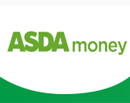
Product Rating
Experience Rating
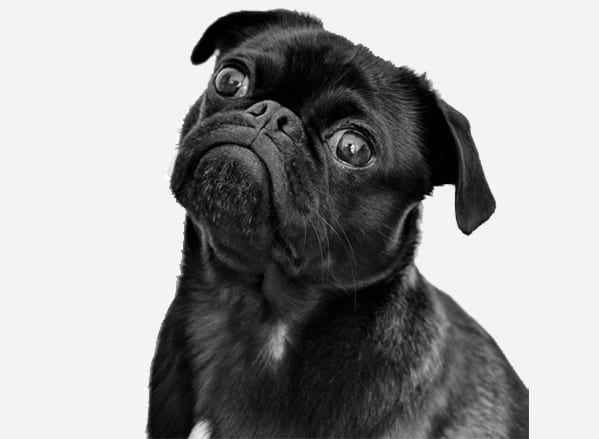
The Pug is a member of the Toy group. The Pug Temperament is affected by several factors, including heredity, training, and socialization. They are small gentle dogs with enormous personalities. They are intelligent and affectionate and can be manipulative, making sure they get what they want which includes being the centre of attention.
Pugs are known as a brachycephalic breed (having been bred to have a flat faces) and can therefore be prone to certain health conditions. Find out what to look out for when buying a Pug and useful breed related advice from the Pug Dog Club.
Pugs are one of three types of short-nosed dogs that are known to have been bred by the Chinese: Evidence of Pug-like dogs have been found in ancient Tibet and Japan.
In the latter 1500s and early 1600s, China began trading with European countries, so they were bought into Europe. Pugs quickly became favourites of royal households. In Holland, the Pug became the official dog of the House of Orange after a Pug reportedly saved the life of William, Prince of Orange, by giving him a warning that the Spaniards were approaching in 1572.
Lady Brassey, made black Pugs fashionable after she brought some back from China in 1886. Out of favour for a while, they have grown in popularity over the last 100 years and at one point became the celebrities dog to be seen with, mainly because of their size, gentle manner, and need for minimal exercise.
Pugs are small sized dogs. Males generally reach a height of 25-33 CM and weigh around 6.4-8.2 Kilos. Females are normally a bit smaller. Like most small dogs, pugs can reach a good age. Most live for between 12 and 15 years, but can suffer from major health problems, which is why finding a good dog insurance policy when they are younger is of paramount importance.
When excited, Pugs are prone to "reverse sneezing" which causes them to quickly gasp and snort. and it’s caused by fluid or debris getting caught under the palate and irritating the throat or limiting breathing. Reverse sneezing episodes are usually not harmful and massaging the dog's throat or covering its nose to make it breathe through its mouth can often shorten a sneezing fit.
Pugs can suffer from Pug Dog Encephalitis (PDE) an inflammatory disease of the central nervous system that is usually progressive and fatal. Symptoms include seizures, depression, ataxia, abnormal gait, and blindness. Female, fawn-colored Pugs younger than 7 years of age are more apt to develop PDE than older, male, and non-fawn colored individuals.
Over 25% of Pugs have elongated palate to some extent, though the number that have this severe enough to warrant veterinary intervention is much lower.
Pugs are well known for their wrinkled fur, flat facial features, compressed jaw, short muzzle and protruding eyes. These features whilst adorable can cause certain health issues for example, the short muzzle can cause respiratory and breathing related problems.
Brachycephalic Obstructive Airway Syndrome (BOAS) This is a combination of conditions that affect the breathing passages and ultimately respiratory issues and the ability to breath. BOAS is very common in Pugs, with some studies estimating that it is present in over 90% of the breed. However the severity varies greatly and only a small number of dogs will end up requiring surgery.
In surveys 11% of pug owners reported eye problems, such as cherry eye, dry eye, corneal ulcerations and cataracts. Pugs have many wrinkles in their faces and bodies. This can lead to irritation and infection. Over 6% of owners sited skin problems, such as yeast and bacterial infection, itching and skin fold dermatitis.
Pugs are very prone to hip dysplasia which refers to an abnormality that causes a poor fitting hip joint and socket. This is often combined with a weakened support of connective tissues and muscles that creates instability. Signs to look for include limping, holding the leg in an odd position, and mobility issues.
You can minimise any health problems by making sure your dog comes from a registered breeder and that you see the puppy with its mother before you buy. Pug puppies currently sell for between £800 and £1500 depending on their pedigree, although the recent coronavirus lockdown has seen prices increase.
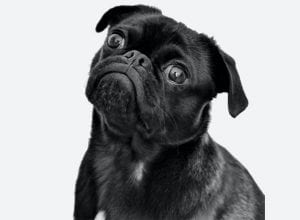
The Pug has a stable temperament, charm, and is outgoing, with a loving disposition. They like to please their owners, so they are generally easy to train. harsh training methods are not for them, as their feelings are easily hurt. Although they can be stubborn, especially when it comes to house training, they’re playful, affectionate dogs who will get along well even with inexperienced pet parents.
As a small, calm breed that are relatively inactive when indoors, they are a good choice for apartment dwellers. Due to the flat shape of the Pug's face, a pug does not do well in extremely hot or cold weather and should be kept indoors and needs a coat outdoors when it is chilly. While Pugs can be good watchdogs, they are not usually big barkers, great if you have neighbours.
Pugs are fairly high maintenance when it comes to their grooming regime. They have a double thick coat, which shed hairs all the time and will therefore need brushing on a regular basis.
You should bath your pug at least a couple of times a month (more if they have a skin condition) and clean the eyes and ears on a regular basis.
There are many suitable brands of dog feed on the market. How much you feed your dog depends on the type of food and the brand. Most reputable dog food manufacturers supply feeding guidelines depending on the size and weight of your dog. Adult Pugs should be fed twice a day and if possible dry food.
Pugs get on with other pets if introduced when young, socialising is important as with all dogs.
Pugs love children but should still be socialised from a young age. Pugs love to play with children in it's own family. Playtime with young friends should be supervised but they do tolerate small children better than many dogs. Most problems arise from poor socialisation and boredom so include children in a training regime. Teach your child never to approach any dog while he's sleeping or eating or to try to take the dog's food away.
This is what you call a "Pug Party"
The Pug lifespan is around 12 to 15 years, although some can live much longer. (The oldest recorded age being 18.5 years for a pug). According to the UK Kennel Club, Neurological disorders are usually the highest cause of death for the Pug breed (27.4%) This refers to any disorder affecting the dog's nervous system.
As discussed above, the Pug breed can suffer health issues, which means more visits to the vet and a higher number of insurance claims. As a result some Insurers charge a higher premium for Pug Insurance.
One of the most common complaints about pet insurance is the increases in renewal premium. There are a number of reasons your premium may increase, but the most common reason is your pets age. From an Insurers point of view the older your pet, the higher the risk of a medical issue.
When choosing dog insurance for your Pug, pay special attention to the age at which an Insurer will either no longer quote or require an additional payment when it comes to settling any claim.
Whilst there are cheaper policies with lower levels of cover are available, the graph below illustrates the average monthly premium increases as your dog gets older. The quotes are based on male Pug aged between 1 and 10, and a lifetime policy with vet fees cover of at least £6,000 per year.
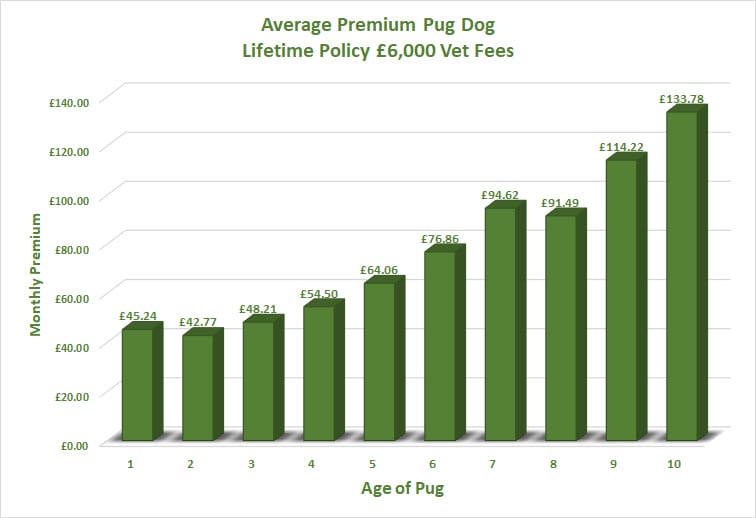
Not everyone will want or can afford the most expensive policy and its always a balance between cover and price. Taking an average of premiums across the market, the graph below illustrates the difference in cost between Time Limited, Maximum Benefit and Lifetime policies for a Pug dog aged 5 with a minimum of £2,000 vet fees cover.
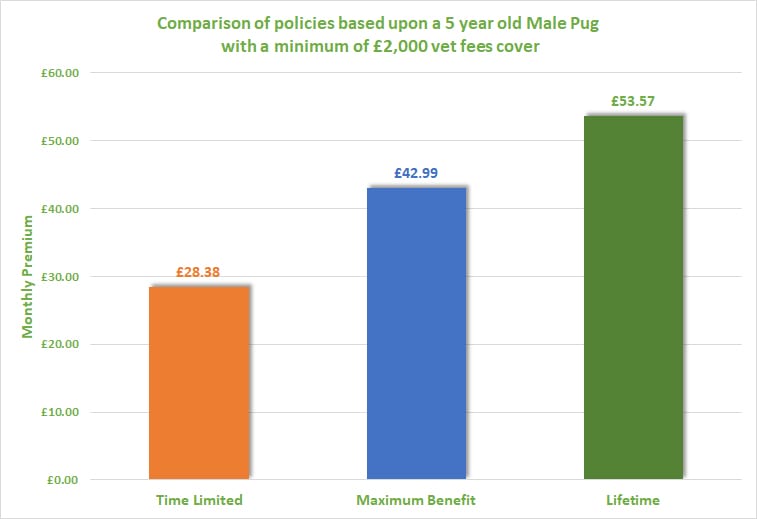
Top Picks
Insurance Provider
Excess
Primary Cover
Guide Price
Type:Dog
Cover:Per Condition Time Limited
Age: 1
Breed: Pug
Group: Toy
99
Per Condition Time Limited 2,000
Complimentary Treatment 500
Dental 2,000
Death from Accident 750
Death from Illness 750
Theft or Straying 750
Advertising and Reward 250
Third Party Liability 1,000,000
Type:Dog
Cover:Per Condition Time Limited
Age: 1
Breed: Pug
Group: Toy
95
Per Condition Time Limited 4,000
Complimentary Treatment 4,000
Dental 4,000
Death from Accident 1,250
Death from Illness 1,250
Theft or Straying 1,250
Advertising and Reward 800
Third Party Liability 1,500,000
Type:Dog
Cover:Maximum Benefit Time Limited
Age: 1
Breed: Pug
Group: Toy
99
Maximum Benefit Time Limited 2,500
Complimentary Treatment 500
Dental 2,500
Death from Accident 250
Death from Illness 250
Theft or Straying 250
Advertising and Reward 250
Third Party Liability 2,000,000
Type:Dog
Cover:Per Condition Time Limited
Age: 1
Breed: Pug
Group: Toy
85
Per Condition Time Limited 2,500
Complimentary Treatment 1,000
Dental 2,500
Death from Accident 650
Death from Illness 650
Theft or Straying 650
Advertising and Reward 650
Third Party Liability 1,000,000
Type:Dog
Cover:Maximum Benefit Time Limited
Age: 1
Breed: Pug
Group: Toy
99
Maximum Benefit Time Limited 3,000
Complimentary Treatment 500
Dental 3,000
Death from Accident 1,000
Death from Illness 1,000
Theft or Straying 1,000
Advertising and Reward 1,000
Third Party Liability 2,000,000
Type:Dog
Cover:Per Condition Time Limited
Age: 1
Breed: Pug
Group: Toy
95
Per Condition Time Limited 4,000
Complimentary Treatment 4,000
Dental 0
Death from Accident 1,500
Death from Illness 1,500
Theft or Straying 1,500
Advertising and Reward 1,000
Third Party Liability 2,500,000
Top Picks
Insurance Provider
Excess
Primary Cover
Guide Price
Type:Dog
Cover:Maximum Benefit Per Condition
Age: 1
Breed: Pug
Group: Toy
80
Maximum Benefit Per Condition 2,000
Complimentary Treatment 1,000
Dental 2,000
Death from Accident 350
Death from Illness 350
Theft or Straying 350
Advertising and Reward 300
Third Party Liability 1,000,000
Type:Dog
Cover:Maximum Benefit Per Condition
Age: 1
Breed: Pug
Group: Toy
75
Maximum Benefit Per Condition 4,000
Complimentary Treatment 400
Dental 4,000
Death from Accident 1,000
Death from Illness 1,000
Theft or Straying 1,000
Advertising and Reward 1,000
Third Party Liability 1,500,000
Type:Dog
Cover:Maximum Benefit Per Condition
Age: 1
Breed: Pug
Group: Toy
80
Maximum Benefit Per Condition 2,000
Complimentary Treatment 750
Dental 2,000
Death from Accident 500
Death from Illness 500
Theft or Straying 500
Advertising and Reward 500
Third Party Liability 2,000,000
Type:Dog
Cover:Maximum Benefit Per Condition
Age: 1
Breed: Pug
Group: Toy
100
Maximum Benefit Per Condition 3,000
Complimentary Treatment 300
Dental 5,000
Death from Accident 250
Death from Illness 250
Theft or Straying 250
Advertising and Reward 100
Third Party Liability 1,000,000
Type:Dog
Cover:Maximum Benefit Per Condition
Age: 1
Breed: Pug
Group: Toy
105
Maximum Benefit Per Condition 7,500
Complimentary Treatment 7,500
Dental 7,500
Death from Accident 1,500
Death from Illness 1,500
Theft or Straying 1,500
Advertising and Reward 850
Third Party Liability 1,500,000
Type:Dog
Cover:Maximum Benefit Per Condition
Age: 1
Breed: Pug
Group: Toy
100
Maximum Benefit Per Condition 6,000
Complimentary Treatment 1,000
Dental 1,000
Death from Accident 1,000
Death from Illness 1,000
Theft or Straying 1,000
Advertising and Reward 750
Third Party Liability 2,000,000
Type:Dog
Cover:Maximum Benefit Per Condition
Age: 1
Breed: Pug
Group: Toy
100
Maximum Benefit Per Condition 4,000
Complimentary Treatment 1,000
Dental 0
Death from Accident 1,000
Death from Illness 1,000
Theft or Straying 1,000
Advertising and Reward 2,000
Third Party Liability 2,000,000
Top Picks
Insurance Provider
Excess
Primary Cover
Guide Price
Type:Dog
Cover:Lifetime Maximum Benefit
Age: 1
Breed: Pug
Group: Toy
80
Lifetime Maximum Benefit 4,000
Complimentary Treatment 750
Dental 4,000
Death from Accident 500
Death from Illness 500
Theft or Straying 500
Advertising and Reward 500
Third Party Liability 2,000,000
Type:Dog
Cover:Lifetime Maximum Benefit
Age: 1
Breed: Pug
Group: Toy
80
Lifetime Maximum Benefit 3,000
Complimentary Treatment 750
Dental 3,000
Death from Accident 500
Death from Illness 0
Theft or Straying 500
Advertising and Reward 500
Third Party Liability 2,000,000
Type:Dog
Cover:Lifetime Maximum Benefit
Age: 1
Breed: Pug
Group: Toy
60
Lifetime Maximum Benefit 10,000
Complimentary Treatment 750
Dental 750
Death from Accident 1,500
Death from Illness 1,500
Theft or Straying 1,500
Advertising and Reward 1,500
Third Party Liability 2,000,000
Type:Dog
Cover:Lifetime Maximum Benefit
Age: 1
Breed: Pug
Group: Toy
99
Lifetime Maximum Benefit 7,000
Complimentary Treatment 1,000
Dental 7,000
Death from Accident 1,000
Death from Illness 1,000
Theft or Straying 1,500
Advertising and Reward 1,500
Third Party Liability 2,000,000
Type:Dog
Cover:Lifetime Maximum Benefit
Age: 1
Breed: Pug
Group: Toy
100
Lifetime Maximum Benefit 6,000
Complimentary Treatment 1,500
Dental 6,000
Death from Accident 1,500
Death from Illness 1,500
Theft or Straying 1,500
Advertising and Reward 1,500
Third Party Liability 2,000,000
Type:Dog
Cover:Lifetime Maximum Benefit
Age: 1
Breed: Pug
Group: Toy
99
Lifetime Maximum Benefit 7,000
Complimentary Treatment 1,000
Dental 7,000
Death from Accident 1,500
Death from Illness 1,500
Theft or Straying 1,500
Advertising and Reward 1,500
Third Party Liability 2,000,000
Type:Dog
Cover:Lifetime Maximum Benefit
Age: 1
Breed: Pug
Group: Toy
100
Lifetime Maximum Benefit 12,000
Complimentary Treatment 1,500
Dental 2,000
Death from Accident 2,000
Death from Illness 2,000
Theft or Straying 2,000
Advertising and Reward 2,000
Third Party Liability 3,000,000
As is often the case it’s a trade off between cost and cover. Its important you find a happy balance, so that should the worst happen, most of the costs are covered by insurance.
Like many pure bred dogs, Pugs can suffer from hereditary congenital health issues. Make sure you insure with a company that will cover this. Some Insurers exclude congenital defects, so it’s important that you check the policy wording carefully.
Having a compressed jaw can cause teeth issues for your Pug, so it’s important to choose a policy that covers Dentistry in respect of not only accidents but illness as well.
Make sure that you take out Insurance as soon as you become the owner of your dog, when he is fit and healthy. If you wait and the dog becomes ill, you will be left footing the bill and the condition will be excluded by Insurers. One final point is that choosing the right company is extremely important. Don’t be influenced by cheap premiums now only to find massive increases in the future. Do your homework and feel free to use our reviews and pet comparison tables to assist you.